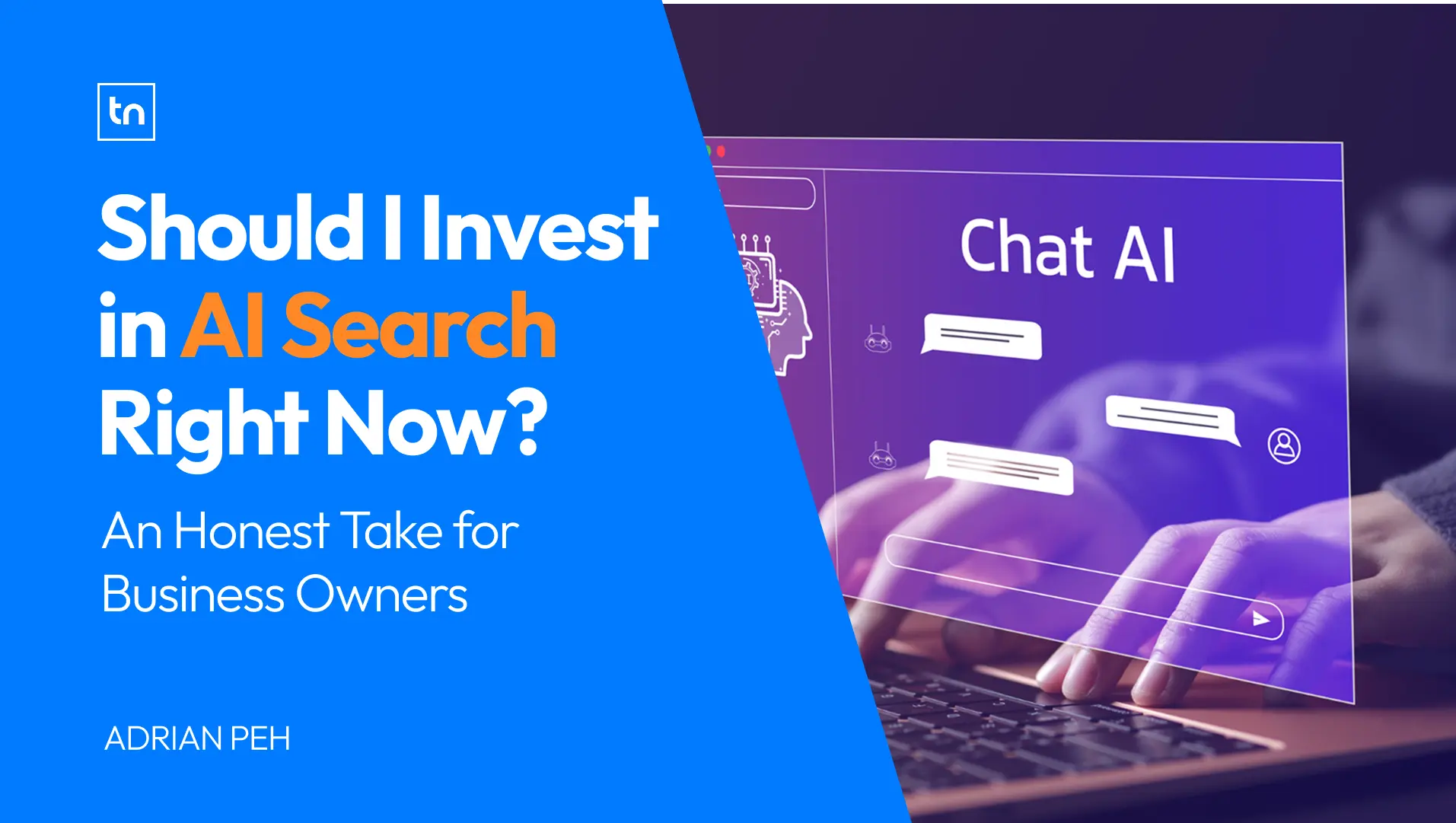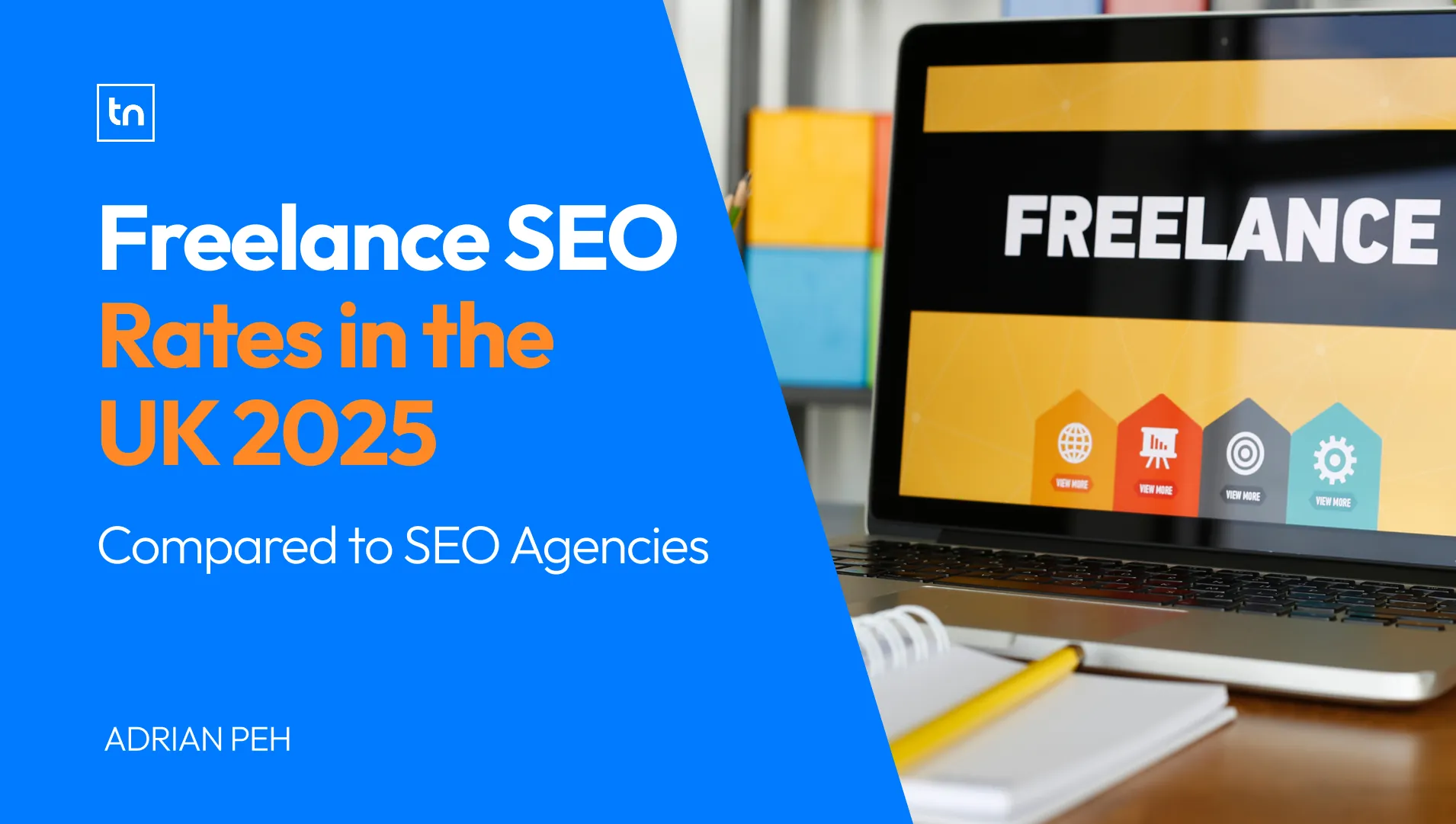Table of Contents
Short answer: not yet.
There’s a lot of noise in the SEO world right now about “AI search optimisation”. Agencies are promoting expensive new packages that promise to get your brand featured in ChatGPT, Perplexity, Copilot, and Google’s AI Overviews.
The truth is that AI search isn’t ready for real business investment – it’s unproven, can’t be properly measured, and overlaps heavily with what you should already be doing through good, traditional SEO.
If you’re a business owner watching every pound, this article will explain why now isn’t the time to spend on AI search – and where your SEO budget will actually deliver results.
AI search usage is growing – but still tiny compared to traditional search
Yes, AI tools like ChatGPT and Perplexity are trending, but their share of overall web traffic remains small. The vast majority of people still start their online journeys with Google Search.
While AI assistants are getting better at providing answers, they’re not yet driving meaningful referral traffic for most businesses. Google still accounts for over half of all web visits, while AI chat platforms contribute a fraction of a percent.
If you’re allocating a marketing budget, it makes sense to optimise for where your customers actually are – and that’s still organic search.
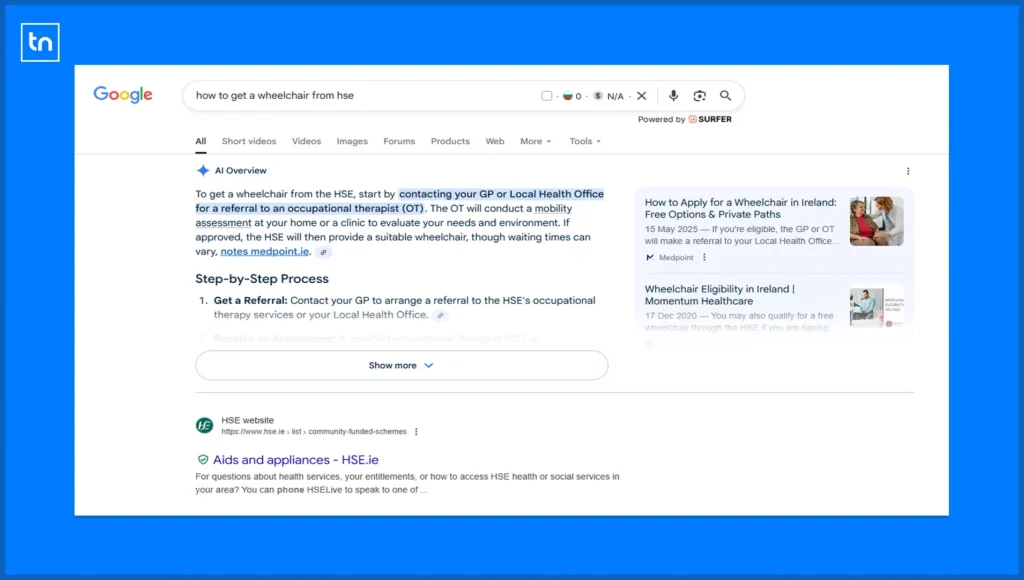
Google’s AI Overviews don’t replace traditional SEO
Google’s own documentation confirms that there’s no special markup or secret method to appear in AI Overviews. The same best practices that help you rank organically are what get your brand cited in AI summaries.
In fact, studies show a growing overlap between sites that appear in AI Overviews and those that already rank well in traditional organic search results. So if you’re investing in technical SEO, creating strong content, and building authority, you’re already positioning your business to appear in AI-driven features.
There’s simply no need to pay extra for “AI search optimisation” when solid SEO does the same job.
You can’t track or measure AI search performance
Here’s the biggest problem with AI search right now: you can’t measure it properly.
Google Search Console doesn’t have a clear filter or reporting option for AI Overview impressions or clicks. Even if your content is cited by AI search, there’s no clean way to prove it in analytics.
The same goes for ChatGPT, Perplexity, and Copilot. They don’t provide referral data, so there’s no way to attribute traffic or conversions back to AI sources.
That means any agency promising results in “AI search” can’t actually show you the numbers. You’d be paying for something you can’t track – and that’s never a smart investment.
Even Google mentioned that no additional optimisation will be needed to get featured in AI overviews.

Click-throughs are declining where AI answers appear
Even when AI tools display your brand or quote your content, you might not get the click.
AI summaries often satisfy the user’s question right on the page, leaving no need to visit your site. Some publishers have already seen significant drops in traffic when AI-generated summaries appear above their links.
This is especially important for small and local businesses that rely on informational searches to attract new customers. Paying more to appear in AI summaries won’t fix the issue if users never actually visit your website.
Instead, focus on local SEO to attract customers who are actively searching for your services in your area – where conversions really happen.
The landscape is volatile and risky
AI search is still a moving target. Google continues to tweak how and when AI Overviews appear, especially after several public mistakes and accuracy issues.
There’s also growing legal and regulatory pressure around AI content, particularly in Europe and the UK. These changes could alter how AI search functions overnight, making it risky to invest heavily right now.
In short, the ground is shifting under AI search. Until it stabilises, it’s not a reliable marketing channel.
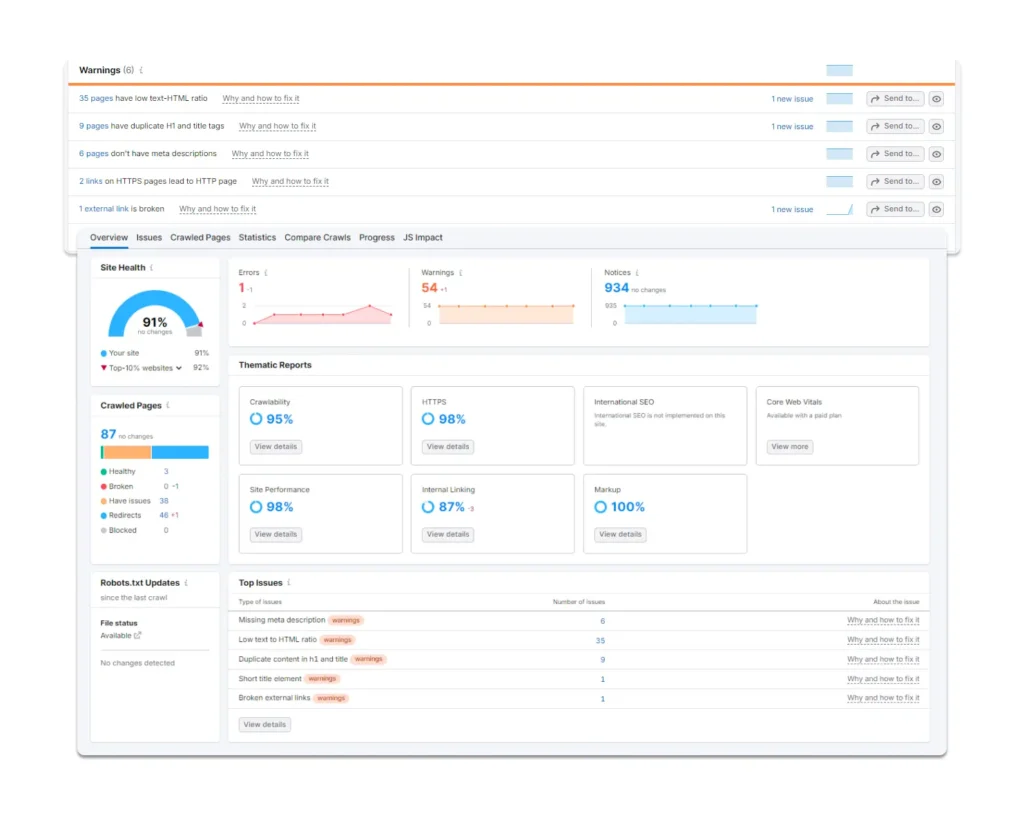
Having trouble with rankings? We can find what’s holding you back.
The “AI search” upsell problem
Let’s be honest – a lot of agencies are using “AI search” as an easy upsell.
Most of what they offer under this label is actually just good SEO practice with a new name. That includes things like:
- Building topic authority and E-E-A-T signals
- Adding clear headings and FAQ sections
- Optimising schema and metadata
- Improving site structure and crawlability
Sound familiar? It’s the same checklist you’d find in a proper SEO audit.
If you’re already investing in SEO services, you’re doing the work that matters. Paying extra for “AI optimisation” doesn’t make sense – you’re simply repurchasing what you already have.
What about Perplexity, Copilot, and ChatGPT Search?
These tools are interesting, and their usage is growing. But their referral traffic is still very limited.
Perplexity, for instance, is great for summarising answers, but it rarely sends visitors to the original source. Microsoft Copilot is growing thanks to Windows integration, but it’s mostly a user assistant, not a discovery engine. ChatGPT has started sending more traffic to publishers, but for most small and medium businesses, that’s a drop in the ocean.
The reality is that until these platforms expose clear referral data and performance tracking, you can’t treat them as core marketing channels.
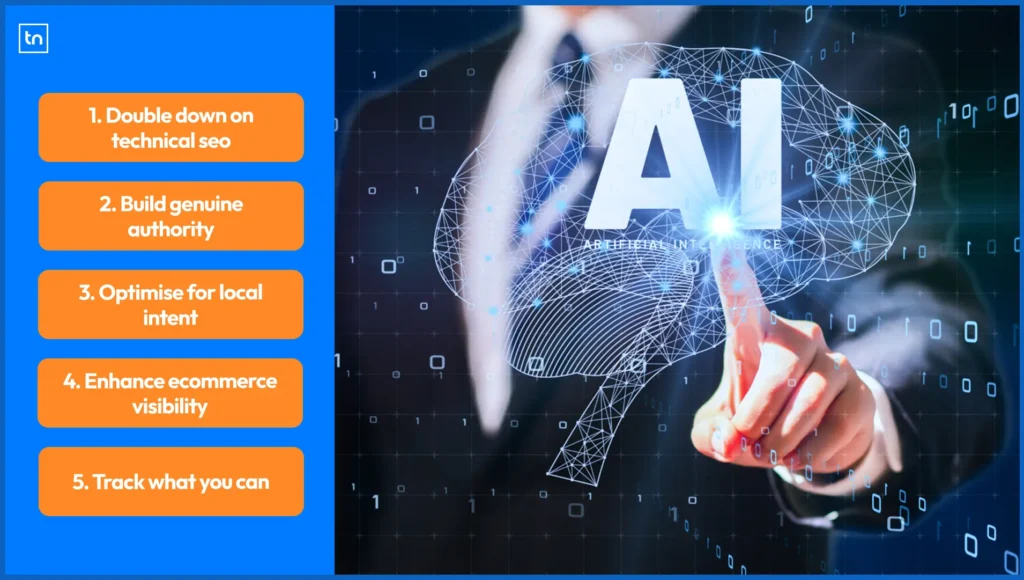
What you should do instead of spending your budget on AI search
Rather than chasing early, unproven trends, focus your efforts on SEO strategies that deliver measurable, long-term ROI – and that naturally position you for AI visibility later.
1. Double down on technical seo
Fix crawl issues, improve page speed, and ensure your site architecture is solid. Strong technical SEO makes it easier for both Google and AI crawlers to understand your content.
2. Build genuine authority
Publish content with expert input, original data, and helpful, trustworthy advice. This not only builds organic rankings but also increases your chances of being cited as a credible source in AI tools.
3. Optimise for local intent
For service-based or location-driven businesses, local SEO is still one of the best ROI activities. Focus on Google Business Profile optimisation, consistent NAP data, and customer reviews.
4. Enhance ecommerce visibility
If you sell products online, ecommerce SEO services can help you capture transactional searches that AI summaries often overlook. Shoppers still prefer to click through to real sites where they can compare, read reviews, and buy securely.
5. Track what you can
Until AI search reporting improves, monitor indirect signals like branded searches, backlinks, and overall organic growth. These remain reliable indicators of brand awareness and authority.
When to consider AI search in future
AI search may become investable down the line, but only when:
- The major platforms provide reliable tracking and referral analytics
- It starts driving measurable, conversion-quality traffic
- Your existing SEO foundations are already strong
When those conditions are met, experimenting with AI search makes sense. But until then, every sign points to staying focused on traditional SEO that already works.
Final thoughts
Right now, AI search is exciting but immature. It’s not measurable, not proven, and not worth carving out a separate budget for.
If your goal is to be discovered in ChatGPT, Copilot, or Google’s AI Overviews, the best strategy is simple: keep doing SEO right. This is what we advice at our SEO agency.
That means investing in high-quality content, strong technical foundations, and ongoing optimisation – the same work that drives organic visibility and also happens to make your brand more likely to be cited by AI.
So, don’t invest in “AI search optimisation” yet. Invest in better SEO. It’s the surest way to protect your visibility today and prepare for whatever AI search becomes tomorrow.
FAQs
AI search uses tools like ChatGPT, Perplexity and Google’s AI Overviews to generate answers rather than list pages. Traditional SEO focuses on ranking websites in search results. In truth, strong SEO practices already feed into how AI systems choose what to show.
If your site is fast, easy to crawl and filled with useful, trustworthy content, you’re already in a good position. A professional SEO audit can confirm whether your site’s technical foundations are strong enough for both traditional and AI-driven search.
Yes. Local SEO delivers direct, measurable results – more calls, visits and enquiries from nearby customers. AI search may evolve, but local visibility remains the most reliable way to attract real business right now.
Not in the foreseeable future. Google and Bing still depend on standard search results to deliver trustworthy information. People continue to click through to real websites for details, reviews and pricing.
Put your budget into proven SEO strategies – technical improvements, content creation, and building online authority. These efforts help you rank today and ensure your business is ready when AI search becomes more measurable.

